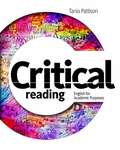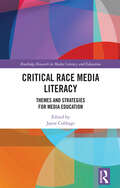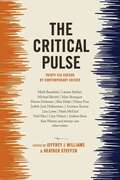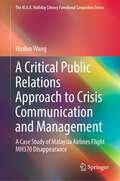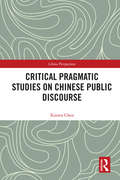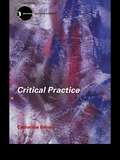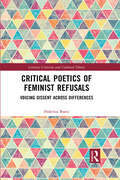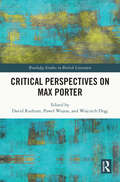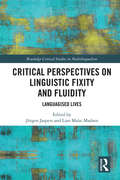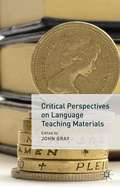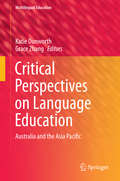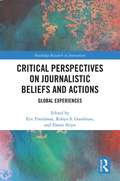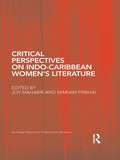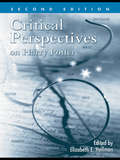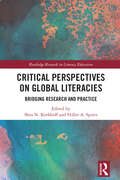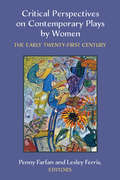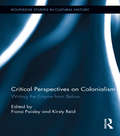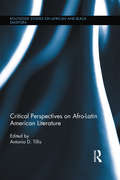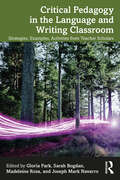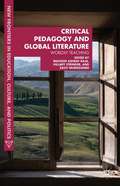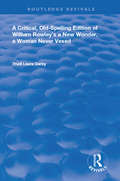- Table View
- List View
Critical Reading: English for Academic Purposes
by Tania PattisonCritical Reading provides a systematic introduction to the process of analyzing and evaluating a written text. Students develop critical reading skills through analysis of texts from authentic sources (journals, newspapers, magazines, and websites) and a variety of academic dsiciplines. They are encouraged to develop their comprehension and vocabulary skills, while forming a reasoned assessment of the effectiveness and validity of a text.
Critical Race Media Literacy: Themes and Strategies for Media Education (Routledge Research in Media Literacy and Education)
by Jayne CubbageThis volume offers deeper exploration and advancement of critical race media literacy, a concept which fuses the genres of media literacy and critical media literacy with critical race theory to bring a new and salient frame to the discussion of media literacy across all levels of education in today’s globalized, race-based, and media-saturated climate. Bridging the gap in research that has not addressed the ways in which media is a conduit of racial dialogue and ideology, the book brings together a diverse group of scholars that explore their perspectives on critical race media literacy as it is experienced from the interface and consumption of a variety of media texts and social phenomena. Topics addressed include news literacy, children’s literature, Black political movements, media protests, and ethnic rock—Critical Race Media Literacy addresses these topics within existing media literacy contexts to enhance media literacy scholarship and educational pedagogy. This book will provide a timely and important resource not only for scholars and students of media literacy and media education but also for educators working in diverse learning settings.
Critical Questions: Invention, Creativity, and the Criticism of Discourse and Media
by Carole Blair Gary A. Copeland William L. Nothstinestudy of critical invention-how critics select the questions they want to ask of a text as critics
The Critical Pulse: Thirty-Six Credos by Contemporary Critics
by Jeffrey J. Williams Heather SteffenThis unprecedented anthology asks thirty-six leading literary and cultural critics to elaborate on the nature of their profession. With the humanities feeling the pinch of financial and political pressures, and its disciplines resting on increasingly uncertain conceptual ground, there couldn't be a better time for critics to reassert their widespread relevance and purpose. These credos boldly defend the function of criticism in contemporary society and showcase its vitality in the era after theory.Essays address literature and politics, with some focusing on the sorry state of higher education and others concentrating on teaching and the fate of the humanities. All reflect the critics' personal, particular experiences. Deeply personal and engaging, these stories move, amuse, and inspire, ultimately encouraging the reader to develop his or her own critical credo with which to approach the world. Reflecting on the past, looking forward to the future, and committed to the power of productive critical thought, this volume proves the value of criticism for today's skeptical audiences.Contributors: Andrew Ross, Amitava Kumar, Lisa Lowe, Vincent B. Leitch, Craig Womack, Jeffrey J. Williams, Marc Bousquet, Katie Hogan, Michelle A. Massé, John Conley, Heather Steffen, Paul Lauter, Cary Nelson, David B. Downing, Barbara Foley, Michael Bérubé, Victor Cohen, Gerald Graff, William Germano, Ann Pellegrini, Bruce Robbins, Kenneth Warren, Diana Fuss, Lauren Berlant, Toril Moi, Morris Dickstein, Rita Felski, David R. Shumway, Mark Bauerlein, Devoney Looser, Stephen Burt, Mark Greif, Kathleen Fitzpatrick, Mark McGurl, Frances Negrón-Muntaner, Judith Jack Halberstam
The Critical Pulse: Thirty-Six Credos by Contemporary Critics
by Jeffrey J. Williams Heather SteffenThis unprecedented anthology asks thirty-six leading literary and cultural critics to elaborate on the nature of their profession. With the humanities feeling the pinch of financial and political pressures, and its disciplines resting on increasingly uncertain conceptual ground, there couldn't be a better time for critics to reassert their widespread relevance and purpose. These credos boldly defend the function of criticism in contemporary society and showcase its vitality in the era after theory. Essays address literature and politics, with some focusing on the sorry state of higher education and others concentrating on teaching and the fate of the humanities. All reflect the critics' personal, particular experiences. Deeply personal and engaging, these stories move, amuse, and inspire, ultimately encouraging the reader to develop his or her own critical credo with which to approach the world. Reflecting on the past, looking forward to the future, and committed to the power of productive critical thought, this volume proves the value of criticism for today's skeptical audiences.
A Critical Public Relations Approach to Crisis Communication and Management: A Case Study of Malaysia Airlines Flight MH370 Disappearance (The M.A.K. Halliday Library Functional Linguistics Series)
by Huabin WangThis book proposes a critical public relations approach to analyzing crisis communication with Malaysia Airlines flight 370 (MH370) disappearance (2014-2018) as a case study. It examines the discursive process of Malaysia’s crisis response and image building, tracing Malaysia Airlines during the immediate response and the Malaysian establishment until the official suspension of the underwater search. The study features a critical discourse analysis of 84 national media texts and 85 response statements, focusing on three aspects: the national media representations of Malaysia’s image, the national carrier and the government’s rhetorical strategies of delivering stances and actions, and the dynamic process of image reconstruction and national recovery. The present project contributes to the current research area by integrating both linguistic and public relations perspectives, and more importantly, by highlighting the ideological impact instead of merely behavioral effectiveness in modern communication research. Target readers may find their interest in corporate crisis communication, critical inquiry about political public relations, and the MH370 incident in general.
Critical Pragmatic Studies on Chinese Public Discourse (China Perspectives)
by Xinren ChenPublic discourse constitutes the language environment of a town or a city, which forms part of the social environment of a country or a region. Based on extensive first-hand data collected from public places, mass media and the Internet, this monograph attempts critical pragmatic studies of public discourse in the contemporary Chinese context.By applying pragmatic theories and analytical instruments to the analysis of the data, including business names, advertisements, public signs and notices, and news, the book showcases such discursive practices as personalization and subjectivization and reveals such social problems as unhealthy social mentalities, “pragmatic traps”, suspect discrimination, and vulgarity. It exemplifies a way of combining the Critical Discourse Analysis (CDA) approach and the pragmatic approach with a clear focus on the pragmatic issues. This book will not only be a necessary addition to the academic discipline of pragmatics in general, and critical pragmatics in particular, but also lay bare the problems existing in the use of public discourse and suggest several ways to improve such use. While it addresses the Chinese data only, the proposed analyses may contribute to international readers’ understanding of public discourse in contemporary China and serve as a reference for similar researches worldwide.
Critical Practice
by Catherine BelseyWhat is poststructuralist theory, and what difference does it make to literary criticism? Where do we find the meaning of the text: in the author's head? in the reader's? Or do we, instead, make meaning in the practice of reading itself? If so, what part do our own values play in the process of interpretation? And what is the role of the text? Catherine Belsey considers these and other questions concerning the relations between human beings and language, readers and texts, writing and cultural politics. Assuming no prior knowledge of poststructuralism, Critical Practice guides the reader confidently through the maze of contemporary theory. It simply and lucidly explains the views of key figures such as Louis Althusser, Roland Barthes, Jacques Lacan and Jacques Derrida, and shows their theories at work in readings of familiar literary texts. Critical Practice argues that theory matters, because it makes a difference to what we do when we read, opening up new possibilities for literary and cultural analysis. Poststructuralism, in conjunction with psychoanalysis and deconstruction, makes radical change to the way we read both a priority and a possibility. With a new chapter, updated guidance on further reading and revisions throughout, this second edition of Critical Practice is the ideal guide to the present and future of literary studies.
Critical Practice
by Katherine BelseyWhat is poststructuralist theory, and what difference does it make to literary criticism? Where do we find the meaning of the text: in the author's head? in the reader's? Or do we, instead, make meaning in the practice of reading itself? If so, what part do our own values play in the process of interpretation? And what is the role of the text? Catherine Belsey considers these and other questions concerning the relations between human beings and language, readers and texts, writing and cultural politics. Critical Practice assumes no prior knowledge of poststructuralism, but guides the reader confidently through the maze of contemporary theory. The volume simply and lucidly explains the views of such key figures as Louis Althusser, Roland Barthes, Jacques Lacan and Jacques Derrida, and shows their theories at work in readings of familiar literary texts.
Critical Poetics of Feminist Refusals: Voicing Dissent Across Differences (Literary Criticism and Cultural Theory)
by Federica BuetiCritical Poetics of Feminist Refusals renders a vivid portrait of the intergenerational and intersectional dialogue between influential feminist writers on how to say no to the conditions of oppression, exclusion, and exploitation imposed by patriarchal and systemically racist capitalist societies. The book provides today’s readers and writers access to the powerful inventory of concepts and techniques that two generations of feminists have assembled for refusing domination and constituting fugitive forms of sociability and writing. Drawing on examples from feminist thinkers, Audre Lorde, Carla Lonzi, Hélène Cixous, Hortense Spillers, Alexis Pauline Gumbs, Anne Boyer and Simone White, the book focuses on how the power dynamics of recognition tie the uses of language to the material conditions of discrimination in everyday life.
Critical Perspectives on Max Porter (Routledge Studies in British Literature)
by David Rudrum Paweł Wojtas Wojciech DrągMax Porter is amongst the most exciting British writers of the twenty-first century. His striking books straddle the divide between poetry and prose as deftly as they combine literary experimentation with mainstream success. This book is the first study of his works to date, which encompass Grief Is the Thing with Feathers (2015), Lanny (2019), The Death of Francis Bacon (2021) and Shy (2023). It features a broad interdisciplinary array of essays (by poets, novelists, literary critics, art historians and educationalists), which collectively place Porter’s works in their contexts, shed light on his artistic vision and interpret his texts from a range of critical perspectives. The volume’s 12 chapters combine readings of the literary, formal, intertextual and experimental aspects of Porter’s works with discussions of their relation to social, political and ethical questions, whilst placing them in dialogue with highly topical critical and cultural debates, such as Englishness in the aftermath of Brexit, ecocriticism, affectivity and posthumanism.
Critical Perspectives on Linguistic Fixity and Fluidity: Languagised Lives (Routledge Critical Studies in Multilingualism)
by Jürgen Jaspers Lian Malai MadsenThis volume offers a critical perspective on current views on linguistic fixity and fluidity in sociolinguistics and highlights empirical accounts alternative to prevailing trends in the field. Featuring accounts from a broad range of regional contexts, the collection takes stock of such terms as "polylingualism", "metrolingualism" and "translanguaging" to question perceptions around multilingual and monolingual language use. The book critiques the status of fluid language use as a more "natural" language practice and in turn, its greater potential for corresponding social transformation, demonstrating the value of linguistic fixity and the continuous debate between fixity and fluidity in multilingual speakers' lives. In providing these accounts, the book seeks not to advocate for linguistic fixity or fluidity, but to argue that sociolinguists pay close attention to the way both types of linguistic practice open up or close down avenues for social transformation. This collection is a key reading for graduate students and scholars in sociolinguistics, multilingualism, and linguistic anthropology.
Critical Perspectives on Language Teaching Materials
by John GrayThis Critical Perspectives on Language Teaching Materials brings together a collection of critical voices on the subject of language teaching materials for use in English, French, Spanish, German and Content and Language Integrated Learning (CLIL) classrooms.
Critical Perspectives on Language Education: Australia and the Asia Pacific (Multilingual Education #11)
by Katie Dunworth Grace ZhangThe studies in this volume investigate how multilingual education involves a critical engagement with questions of identity and culture, and a movement towards new ways of being and belonging. It addresses previously under-explored issues, in particular the integration of theories like 'thirdness', and practices of language education and maintenance with relevance to the Asia-Pacific region. The analyses reveal the delicate balance of interests of all stakeholders and offer detailed insights into the reality of multilingual education, with specific examples of Chinese, English, Japanese and Tamil. In a globalised world, effective language education has become increasingly important, and the studies presented here have the potential to inform and advance evidence-based multilingual education through adding important dimensions of theoretical exploration and refreshing empirical resources.
Critical Perspectives on Journalistic Beliefs and Actions: Global Experiences (Routledge Research in Journalism)
by Eric Freedman Robyn S. Goodman Elanie SteynThis book provides case studies, many incorporating in-depth interviews and surveys of journalists. It examines issues such as journalists’ attitudes toward their contributions to society; the impact of industry and technological changes; culture and minority issues in the newsroom and profession; the impact of censorship and self-censorship; and coping with psychological pressures and physical safety dilemmas. Its chapters also highlight journalists’ challenges in national and multinational contexts. International scholars, conducting research within a wide range of authoritarian, semi-democratic, and democratic systems, contributed to this examination of journalistic practices in the Arab World, Australia, Bangladesh, Bulgaria, China, Denmark, India, Kenya, Kyrgyzstan, Malaysia, Mexico, Russia, Samoa, South Africa, Taiwan, Turkey, and the United States.
Critical Perspectives on Indo-Caribbean Women's Literature (Routledge Research in Postcolonial Literatures #41)
by Joy Mahabir Mariam PirbhaiThis book is the first collection on Indo-Caribbean women's writing and the first work to offer a sustained analysis of the literature from a range of theoretical and critical perspectives, such as ecocriticism, feminist, queer, post-colonial and Caribbean cultural theories. The essays not only lay the framework of an emerging and growing field, but also critically situate internationally acclaimed writers such as Shani Mootoo, Lakshmi Persaud and Ramabai Espinet within this emerging tradition. Indo-Caribbean women writers provide a fresh new perspective in Caribbean literature, be it in their unique representations of plantation history, anti-colonial movements, diasporic identities, feminisms, ethnicity and race, or contemporary Caribbean societies and culture. The book offers a theoretical reading of the poetics, politics and cultural traditions that inform Indo-Caribbean women's writing, arguing that while women writers work with and through postcolonial and Caribbean cultural theories, they also respond to a distinctive set of influences and realities specific to their positioning within the Indo-Caribbean community and the wider national, regional and global imaginary. Contributors visit the overlap between national and transnational engagements in Indo-Caribbean women's literature, considering the writers' response to local or nationally specific contexts, and the writers' response to the diasporic and transnational modalities of Caribbean and Indo-Caribbean communities.
Critical Perspectives on Harry Potter
by Elizabeth E. HeilmanThis thoroughly revised edition includes updated essays on cultural themes and literary analysis, and its new essays analyze the full scope of the seven-book series as both pop cultural phenomenon and as a set of literary texts. Critical Perspectives on Harry Potter, Second Edition draws on a wider range of intellectual traditions to explore the texts, including moral-theological analysis, psychoanalytic perspectives, and philosophy of technology. The Harry Potter novels engage the social, cultural, and psychological preoccupations of our times, and Critical Perspectives on Harry Potter, Second Edition examines these worlds of consciousness and culture, ultimately revealing how modern anxieties and fixations are reflected in these powerful texts. ("DISCLAIMER: This book is not authorized, approved, licensed, or endorsed by J.K. Rowling, Warner Bros. Entertainment Inc., or anyone associated with the Harry Potter books or movies.")
Critical Perspectives on Global Literacies: Bridging Research and Practice (Routledge Research in Literacy Education)
by Shea N. Kerkhoff Hiller A. SpiresThis book offers critical perspectives on global literacies, connecting research, theory, and practice. An emerging concept in the literacy field, many scholars agree on the need for students to develop global literacies, yet few agree on a widely accepted definition. Based on a synthesis of the literature, the editors formulate a definition of global literacies with four dimensions, including: literacy as a human right in all nations around the world; critical reading and creation of multimodal texts about global issues; intercultural communication and reciprocal collaboration with globally diverse others; and transformative action for social and environmental justice that traverses borders. Taking this shared, proposed definition as a starting point, the chapters then offer contextualized examples of global literacies from K-12 and teacher education classrooms to make explicit links between research and practice. The contributors interact with and interrogate the book’s definition of global literacies using a common framework of critical theory. As such, this book provides both emerging and established scholars with critical frameworks for positioning global literacies in ways that are relevant, dynamic, and forward thinking.
Critical Perspectives on Contemporary Plays by Women: The Early Twenty-First Century
by Penny Farfan Lesley FerrisThis book foregrounds some of the ways in which women playwrights from across a range of contexts and working in a variety of forms and styles are illuminating the contemporary world while also contributing to its reshaping as they reflect, rethink, and reimagine it through their work for the stage. The book is framed by a substantial introduction that sets forth the critical vision and structure of the book as a whole, and an afterword that points toward emerging currents in and expansions of the contemporary field of playwriting by women on the cusp of the third decade of the twenty-first century. Within this frame, the twenty-eight chapters that form the main body of the book, each focusing on a single play of critical significance, together constitute a multifaceted, inevitably partial, yet nonetheless integral picture of the work of women playwrights since 2000 as they engage with some of the most pressing issues of our time. Some of these issues include the continuing oppression of and violence against women, people of color, LGBTQ+ people, and ethnic minorities; the ongoing processes of decolonization; the consequences of neoliberal capitalism; the devastation and enduring trauma of war; global migration and the refugee crisis; the turn to right-wing populism; and the impact of climate change, including environmental disaster and species extinction. The book is structured into seven sections: Replaying the Canon; Representing Histories; Staging Lives; Re-imagining Family; Navigating Communities; Articulating Intersections; and New World Order(s). These sections group clusters of plays according to the broad critical actions they perform or, in the case of the final section, the new world orders that they capture through their stagings of the seeming impasse of the politically and environmentally catastrophic global present moment. There are many other points of resonance among and across the plays, but this seven-part structure foregrounds the broader actions that drive the plays, both in the Aristotelian dramaturgical sense and in the larger sense of the critical interventions that the plays creatively enact. In this way, the seven-part structure establishes correspondences across the great diversity of dramatic material represented in the book while at the same time identifying key methods of critical approach and areas of focus that align the book’s contributors across this diversity. The structure of the book thus parallels what the playwrights themselves are doing, but also how the contributors are approaching their work. Plays featured in the book are from Canada, Australia, South Africa, the US, the UK, France, Argentina, New Zealand, Syria, Brazil, Italy, and Austria; the playwrights include Margaret Atwood, Leah Purcell, Yaël Farber, Paula Vogel, Adrienne Kennedy, Suzan-Lori Parks, debbie tucker green, Lisa Loomer, Hélène Cixous, Anna Deavere Smith, Lola Arias, Lisa Kron and Jeanine Tesori, Marie Clements, Quiara Alegría Hudes, Alia Bano, Holly Hughes, Whiti Hereaka, Julia Cho, Liwaa Yazji, Grace Passô, Dominique Morisseau, Emma Dante, Frances Ya-Chu Cowhig, Lynn Nottage, Elfriede Jelinek, Caryl Churchill, Colleen Murphy, and Lucy Kirkwood. Encompassing several generations of playwrights and scholars, ranging from the most senior to mid-career to emerging voices, the book will be essential reading for established researchers, a valuable learning resource for students at all levels, and a useful and accessible guide for theater practitioners and interested theater-goers.
Critical Perspectives on Colonialism: Writing the Empire from Below (Routledge Studies in Cultural History)
by Fiona Paisley Kirsty ReidThis collection brings much-needed focus to the vibrancy and vitality of minority and marginal writing about empire, and to their implications as expressions of embodied contact between imperial power and those negotiating its consequences from "below." The chapters explore how less powerful and less privileged actors in metropolitan and colonial societies within the British Empire have made use of the written word and of the power of speech, public performance, and street politics. This book breaks new ground by combining work about marginalized figures from within Britain as well as counterparts in the colonies, ranging from published sources such as indigenous newspapers to ordinary and everyday writings including diaries, letters, petitions, ballads, suicide notes, and more. Each chapter engages with the methodological implications of working with everyday scribblings and asks what these alternate modernities and histories mean for the larger critique of the "imperial archive" that has shaped much of the most interesting writing on empire in the past decade.
Critical Perspectives on Afro-Latin American Literature (Routledge Studies on African and Black Diaspora)
by Antonio D. TillisAfter generations of being rendered virtually invisible by the US academy in critical anthologies and literary histories, writing by Latin Americans of African ancestry has become represented by a booming corpus of intellectual and critical investigation. This volume aims to provide an introduction to the literary worlds and perceptions of national culture and identity of authors from Spanish-America, Brazil, and uniquely, Equatorial Guinea, thus contextually connecting Africa to the history of Spanish colonization. The importance of Latin America literature to the discipline of African Diaspora studies is immeasurable, and this edited collection provides a ripe cultural context for critical comparative analysis among the vast geographies that encompass African and African Diaspora studies. Scholars in the area of African Diaspora Studies, Black Studies, Latin American Studies, and American literature will be able to utilize the eleven essays in this edition to enhance classroom instruction and further academic research.
Critical Pedagogy in the Language and Writing Classroom: Strategies, Examples, Activities from Teacher Scholars
by Gloria Park Sarah Bogdan Madeleine Rosa Joseph Mark NavarroThis volume introduces theory-to-practice-based critical pedagogy grounded in Paulo Freire’s scholarship to language and literacy learning settings. The chapters present authentic experiences of teacher-scholars, feature real-world examples and activities ready for implementation in the classroom, and provide nuanced guidance for future teachers. The examples and activities from teacher-scholars place critical pedagogy at the heart of classroom contexts and cover key topics, including place-based pedagogy, contemplative pedagogy, technology within the classroom, and translingual and multimodal paradigms. The chapters include further readings and discussion questions that challenge assumptions and promote deeper reflection, and can be modified for different teaching contexts. This practical volume is essential reading for students and scholars in TESOL and critical pedagogy.
Critical Pedagogy And Global Literature
by Masood Ashraf Raja Hillary Stringer Zach VandezandeIn one volume, this edited collection provides both a theoretical and praxis-driven engagement with teaching world literature, focusing on various aspects of critical pedagogy. Included are nine praxis-driven essays by instructors who have taught world literature courses at the university level.
The Critical Path and Other Writings on Critical Theory, 1963-1975
by Alvin A. Lee Eva Kushner Jean O'GradyThis volume, which collects Northrop Frye's writings on the theory of literary criticism from the middle period of his career, includes one of Frye's own favourites, The Critical Path (1971). A highly important marker of Frye's career, The Critical Path openly addresses topics that he had previously been reluctant to discuss as fully, including the importance of literature to society, the responsibilities of critics, and the deeper rationales for studying literature.Filled with insightful texts that indicate his transition from literary critic to a theorist of language, myth, and human culture, this edition helps to illuminate many of the ideas and arguments that would appear later in The Great Code and Words with Power. Accompanied by the rigorous scholarship for which the series is renowned, this is another valuable contribution to literary criticism and theory.
A Critical, Old-Spelling Edition of William Rowley's A New Wonder, A Woman Never Vexed (Routledge Revivals)
by Trudi Laura DarbyFirst published in 1988, this book offers a critical examination of William Rowley's 1632 play, A New Wonder, A Woman Never Vexed, including chapters on structure and technique, themes, critical history and staging.
